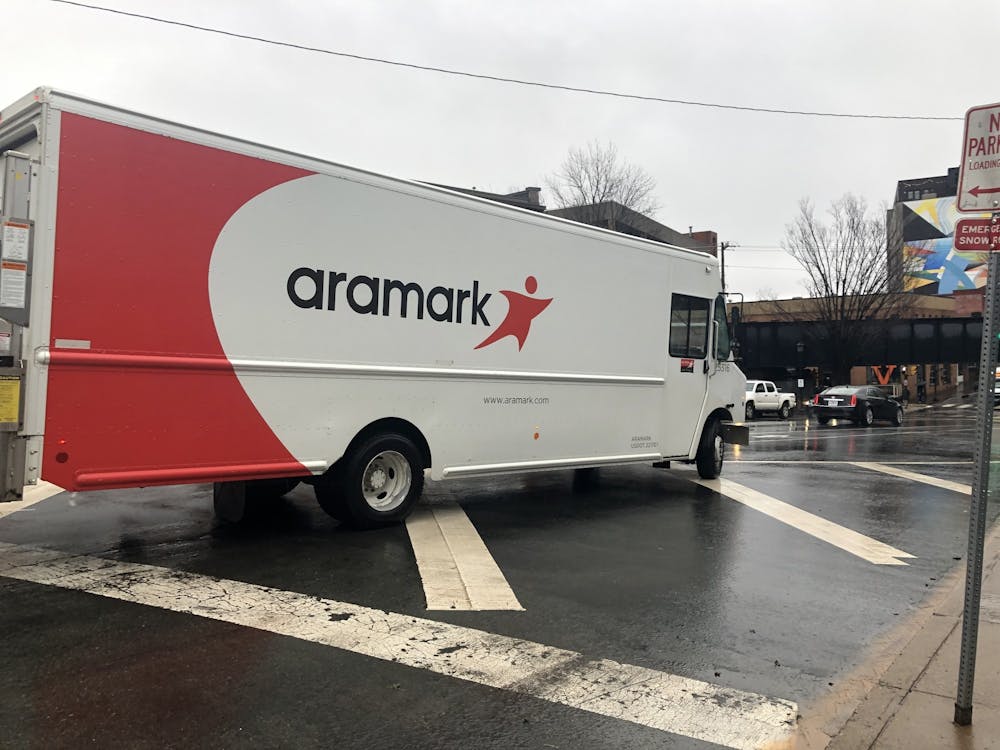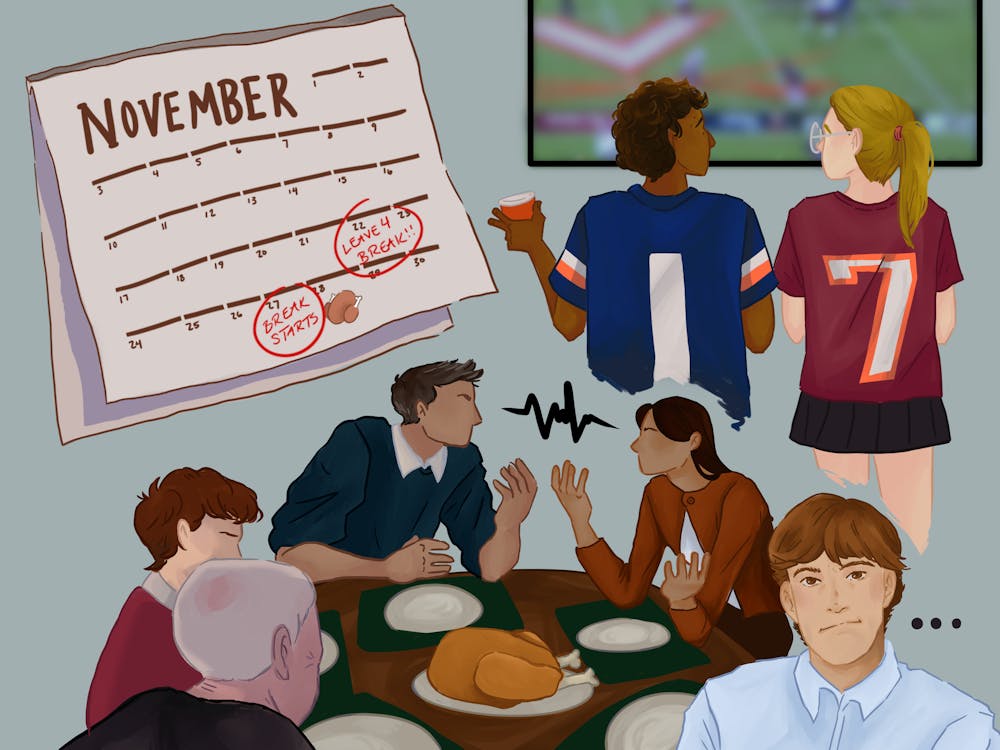University Dining workers were laid off by Aramark — a University dining service provider — when their workplaces were shuttered during the University’s transition to long-term online learning.
All dining facilities — with the exception of Observatory Hill Dining Hall — shut down March 17 as part of the University’s operational plan. Food services are limited to takeout and grab-and-go, and students who get their food from O’Hill cannot eat inside the facility.
Some University Dining employees who already expected to be temporarily laid off over the summer may now go without income for nearly six months. Laura — a former University Dining cook, who asked that her real name remain private because she is applying for jobs — said only a “skeleton crew” of managers and essential staff are working in the University Dining facilities during the partial shutdown.
“When there are no students at the University, there's no work for the Aramark employees,” Laura said in an interview with The Cavalier Daily. “This is what would happen over the summer, except it was extremely fast and there was no time to make any preparation or search for another job ... I'll definitely be laid off until the fall.”
Laura was dismissed with a text message from her manager when Aramark closed the kitchen where she had worked for almost a year. The formal letter she received cited the “business impact” of the virus as the reason for the layoffs. Laura said she feels “disrespected” by the way Aramark handled her layoff. She hopes to find another job before the dining facilities re-open.
Laura is one of many contracted Aramark workers around the world who have been sent home indefinitely and without pay due to coronavirus-related facility closures at the stadiums, event venues, schools and even medical equipment supply facilities where they worked. Many have not received communications from the company and do not know when they will work again.
Spokespeople from the University and Aramark did not acknowledge the layoffs in their comments to The Cavalier Daily, but confirmed that negotiations between the University and Aramark are still pending.
Aramark announces benefits for some during pandemic
Aramark will not offer them additional paid leave unless they have “a confirmed case of COVID-19” or “are quarantined due to COVID-19 related symptoms or exposure,” according to CEO John Zillmer’s March 18 press release. The company will provide sick employees up to 21 extra days off once they have exhausted all other paid leave.
Karen Cutler, the vice president of communications and public affairs at Aramark, confirmed the policy with The Cavalier Daily.
Employees with company-paid medical benefits will have their coverage extended through the end of June under the plan, as well, but Laura was unsure if she would have access to her paid leave or her insurance when she was first laid off.
She found out that her insurance had been deactivated when she went to the pharmacy to pick up a prescription and was charged full-price — nearly $200 — for her medication. She had already paid the premiums for the month’s coverage out of her last paycheck.
“[I was] just kind of at a loss,” Laura said. “I was thinking, ‘What do they expect me to do?’”
Laura’s former manager texted her several days later that Aramark had reinstated her insurance for the remainder of the month, but did not offer an explanation for the lapse in coverage. After weeks of uncertainty, Laura’s coverage was extended again Monday — this time through June — when she contacted management about the press release.
Paid time off has proved more difficult to come by.
Aramark employees who are still working do not receive additional days off to prevent community spread of COVID-19, either, according to a March 13 press release that has since been removed from the company’s website.
Another Aramark employee at the University who spoke with The Cavalier Daily — who is in an age group that is more vulnerable to the coronavirus — stopped working voluntarily to avoid contracting or potentially spreading the virus. The employee — who spoke on the condition of anonymity to protect their job — plans to join millions of Americans and hundreds of Aramark workers in filing for unemployment when they run out of sick days.
Communications with contracted workers
Aramark employees outside the University also say they are frustrated with the company’s lack of transparency with its workers — especially regarding pay.
Andrew Wiley, an Aramark worker in a Philadelphia stadium, told The Cavalier Daily that he has lost income from 15 events that have been canceled due to the pandemic, but that an Aramark representative has only contacted him once — to inform him that the building where he worked was closed. The email did not mention pay. Wiley marked every day that passed without hearing from Aramark “in regards to them paying their employees during this layoff” on Twitter after the company wiped his work schedule.
Wiley had still heard nothing from Aramark when Comcast Spectacor and the Philadelphia 76ers NBA team announced that they would offer temporary financial support for other concessions workers at the Wells Fargo Center. Wiley and 800 other contracted workers were not included in the donation because they are employed by Aramark, not the stadium or Comcast Spectacor.
“Still waiting on you, @AramarkSports," Wiley posted March 25 in response to the announcement. “I’m sure you have extra cash from the $14.50 beers you’re slingin’ down at the @WellsFargoCtr. Pathetic.”
It had been 13 days since Aramark stopped scheduling or communicating with him, according to his Tweets.
Rae Banks — an Aramark employee of three years who worked at a Wake Forest University dining facility in Winston-Salem, N.C. — also told The Cavalier Daily that she resented Aramark’s lack of communication about the terms of her temporary layoff — or about the coronavirus at all.
“It makes me sad knowing that I work for a company [that doesn’t] value their employees enough for a simple response towards the pandemic that’s affecting us,” Banks wrote to The Cavalier Daily.
Banks’ only communication about her job came from the university’s director of food services, who notified Banks and 55 of her co-workers that they would not return to work until after students’ extended spring break in a mass email. It did not mention their wages.
“[There] was no clarification about any employee benefits or pay while being out for the duration of those two weeks,” Banks wrote to The Cavalier Daily. “I’m a person who lives paycheck to paycheck so I can’t go days without working because I need to afford things like rent, food and utilities in order to keep my lifestyle afloat.”
While employees say they were not notified that they would stop receiving pay, Zillmer, Aramark’s CEO, reassured shareholders of the company’s “financial flexibility” in part because it would not pay for labor and supplies in closed locations, causing stocks to soar 41 percent March 19.
“Our employees, if the operations are closed, typically are not paid,” Zillmer reportedly said to investors earlier this month.
Zillmer announced the company’s employee benefits — which do not include compensation for lost wages — that week. Wiley and Banks told The Cavalier Daily that the aid package — which allows employees to cash in their sick leave and keep their health insurance, if they have it, through June — does little to help hourly and uninsured employees.
Aramark’s COVID-19 benefit plan “doesn’t affect me at all,” Wiley wrote to The Cavalier Daily. “I don’t have benefits through Aramark. I don’t get sick days. I’m an hourly employee who isn’t getting paid.”
Banks, who is covered by her parents’ health insurance, will not receive benefits from the company, either. She and many of her co-workers may be jobless until the fall, as Wake Forest President Nathan Hatch canceled in-person classes for the rest of the semester to mitigate the spread of COVID-19.
An Aramark food service worker at Western Carolina University in Cullowhee, N.C. also criticized the benefits, which they believe exclude too many employees during the crisis.
“None of the Aramark benefits actually help unless you have accumulated copious amounts of [paid time off], and you only receive benefits if you contract [the virus],” they wrote to The Cavalier Daily. “I have worked 40+ hour weeks for Aramark for almost two years. Outlasted countless managers, worked holidays, come in on my off days, worked 13 hour shifts, skipped breaks and all to be told that I must contract COVID-19 for them to care.”
The employee requested anonymity for fear of retribution from the company.
University response
Student activists argue that the University has a responsibility to support all of its contracted workers during the partial shutdown, even if they don’t sign their paychecks. Their community petition has over 880 signatures as of press time.
The University’s full-time contracted workers only began earning a $15 per hour minimum wage this year after extensive negotiations and decades of activism, but their wages are not guaranteed during the University’s partial shutdown. All direct University employees, however, will continue to be paid “for the foreseeable future” — even if they cannot work remotely or be re-deployed to other tasks.
The gap could leave more than 1,000 employees who work on Grounds for the University’s contractors — including child care providers Bright Horizons and KinderCare, mail service provider Excela and food service providers Morrison and Aramark — without pay until classes resume on-Grounds in August.
The petition’s nine student authors cited University President Jim Ryan’s successful living wage negotiations with Aramark last year as evidence that the University can and should “guarantee paid sick leave and subsidize the cost of living while workers may be unable to attend their workplace.”
“Considering that the UVA administration negotiated with Aramark and other contractors to increase the wage to $15 in exchange for cutting hours and health care benefits, the University must support UVA’s workforce — both direct and contracted,” a previous version of the petition said.
The University has not defined its position towards contracted workers during the partial shutdown. Ryan and Provost Liz Magill said the University is working with individual contractors to make case-by-case determinations about compensation for contracted workers whose jobs have been compromised by the University’s partial shutdown in their March 17 email to the community.
“We have relationships with a wide range of contractors across the University, which present a variety of situations,” Ryan and Magill said. “We are in active conversations with these contractors and hope to be able to provide an update fairly soon.”
The update has not been released as of press time, but spokespeople for the University and Aramark told The Cavalier Daily that the possibility of state and federal unemployment aid is a key consideration in the ongoing discussions.
Negotiations also center on “how these employees may be re-deployed in the weeks and months ahead,” according to the University’s coronavirus website, which elaborated on Ryan and Magill’s announcement.
The University has no additional information on the discussions as of March 31, Wes Hester, director of media relations and deputy University spokesperson, told The Cavalier Daily.
Jacquelyn Kim contributed reporting for this story.





